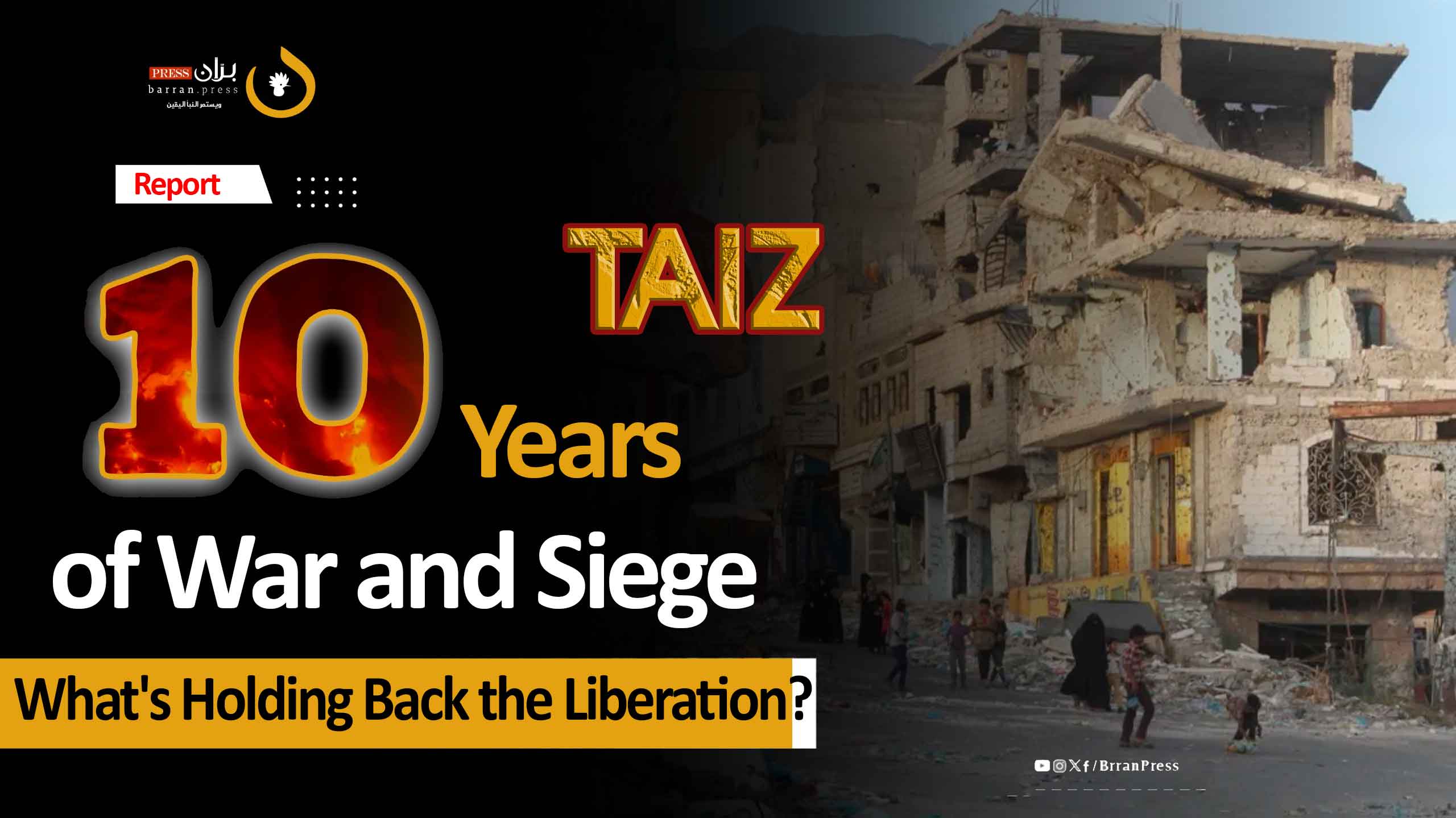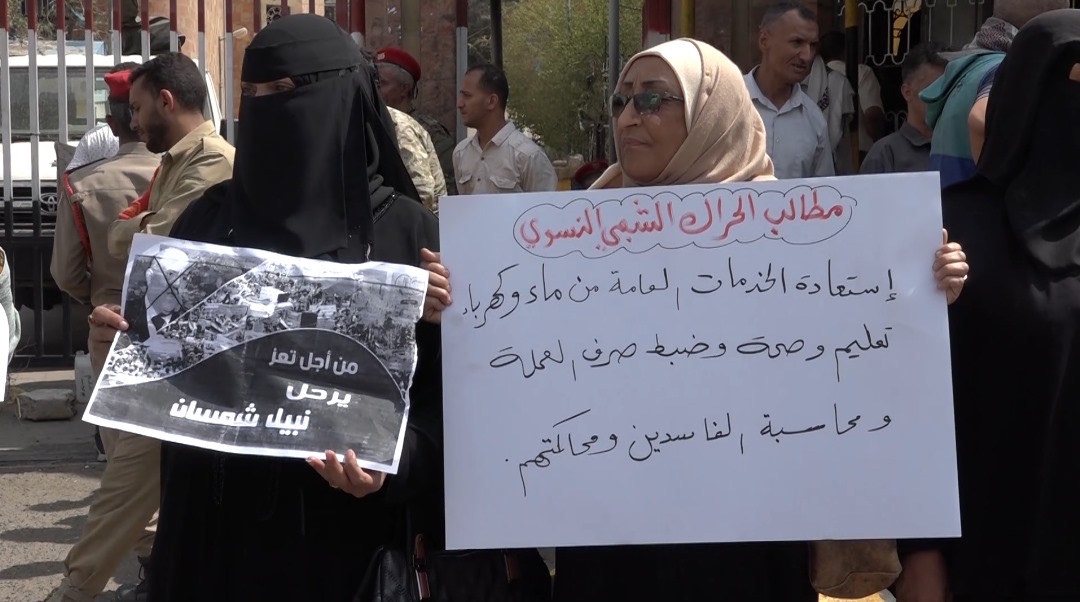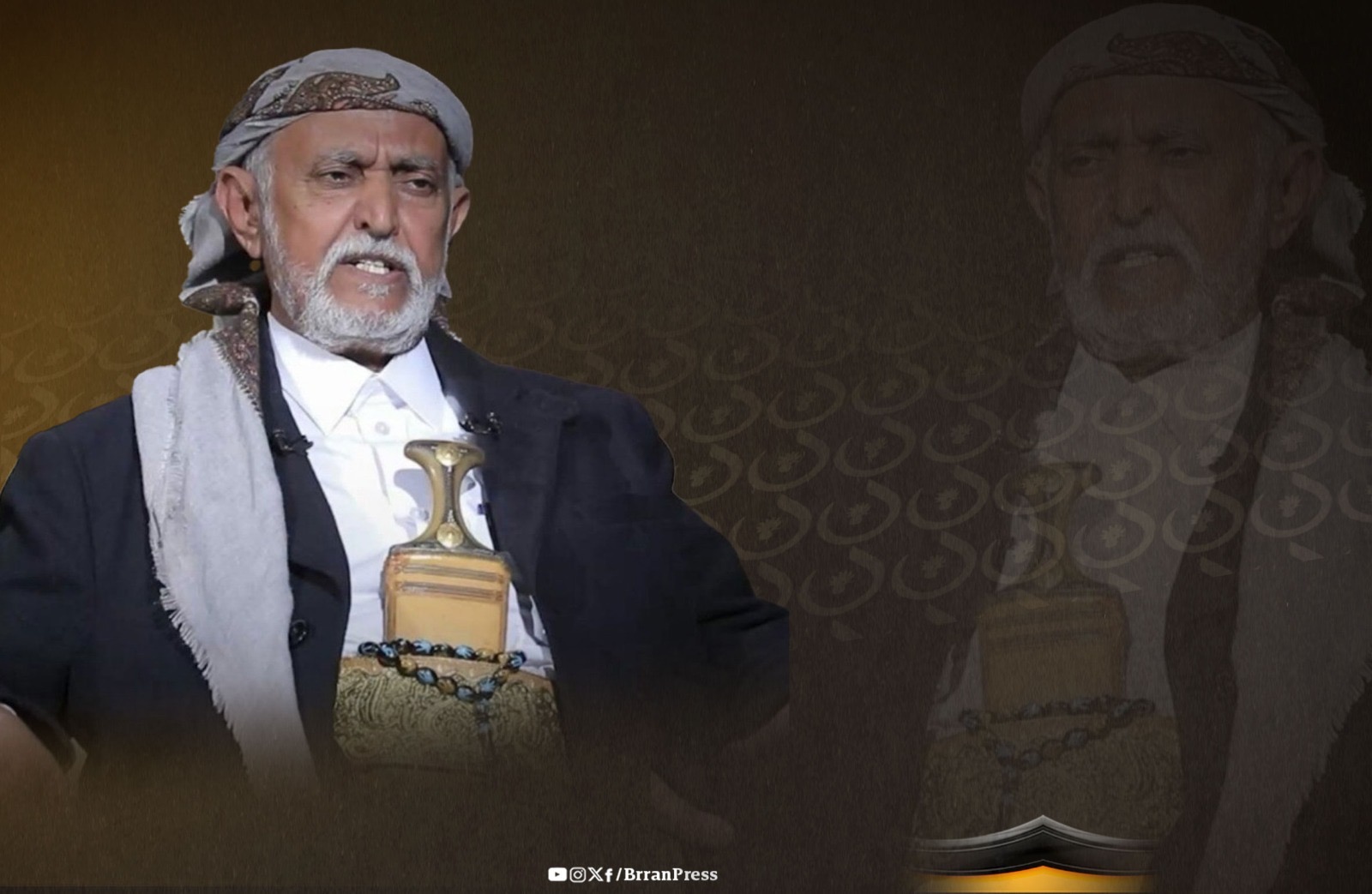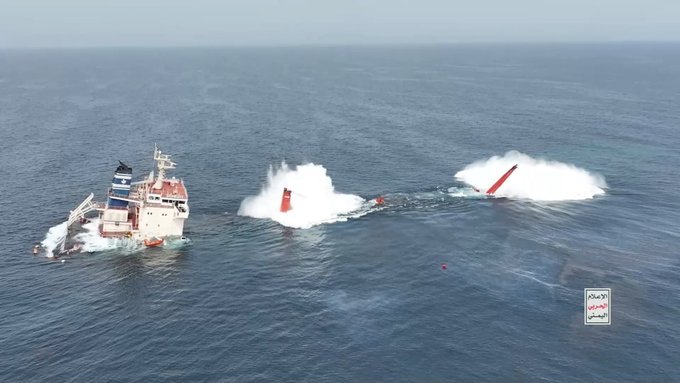
Bran Press | Report by Difallah Al-Sufi
The recent visit of Yemen's Presidential Leadership Council Chairman, Rashad Al-Alimi, to the city of Taiz (southwest of the country) has brought back questions about the reasons behind the stalled liberation of the city and whether the visit will push for the resumption of the liberation process.
On Tuesday, August 27th, the Chairman of the Presidential Leadership Council, accompanied by Council members Abdullah Al-Alimi and Othman Majli, along with several ministers, arrived in Taiz. This marked the first visit of this level in a decade and a half and was met with significant public and official enthusiasm.
According to the official Yemeni News Agency Saba, Al-Alimi inspected several battlefronts in the governorate, praising the combat readiness of the army and resistance forces, including their "growing training and qualification capabilities at all levels."
Al-Alimi stated during a meeting with local authorities that "the best way to repay this governorate is to achieve a complete liberation and restore it to its former glory as a launchpad for liberation from the forces of tyranny, colonialism, and priesthood in all parts of the country."
Following the visit, many questioned the obstacles to completing the liberation of Taiz and breaking the siege imposed by the Houthi group, designated as a terrorist organization, on the city for ten years. This siege has inflicted severe suffering on the approximately four million people living within its borders.
A Contingent Decision
Regarding the decision to liberate, Taiz's First Deputy Governor, Sheikh Arif Jamal, told Barran Press, "With the international and regional changes, the decision on war has become contingent on the international and regional parties and the legitimate government."
Despite these changes, he stated, "We believe that we are on the verge of a decisive battle with the Houthi group, which only understands the language of force."
Regarding the nature of this battle, Sheikh Jamal, who is the head of the Taiz branch of the General People's Congress party, clarified that it is not limited to "liberating Taiz, but rather to purging Yemen of this group (the Houthis) and restoring the state and its capital, Sana'a."
Rewarding Taiz
Jamal told Barran Press, "The battle to liberate Taiz is the great project that all forces within the besieged city are striving for. They have managed to partially break the siege and normalize daily life."
He added that "the conviction of the people of Taiz, with their army and resistance, is to complete the liberation of the governorate and move towards reclaiming Sana'a and the state institutions."
He pointed out that "President Rashad Al-Alimi's words are clear: the greatest reward that Taiz deserves, which has suffered greatly and made sacrifices, is the completion of its liberation. No matter how some try to deviate from this path, this is the current direction."
Consolidating the State
Sheikh Jamal spoke to Barran Press about the early beginnings of the resistance in Taiz, saying that it "broke the Houthi project at the start of the popular resistance when its sons, from all components, united with the popular resistance." He added that Taiz has remained "in a fight with the Houthis for ten years, offering thousands of martyrs and wounded, and has managed to confront the Houthi project and break its backbone."
At the same time, he said that Taiz has managed to "restore the state and its institutions during the years of war and Houthi siege under difficult circumstances. They wanted Taiz to become a swamp for terrorism and gangs, but through its resistance and army, it has managed to solidify the state."
Jamal believes that "Taiz today is not the Taiz of yesterday. Security and services have stabilized, and displaced citizens have returned."
Obstacles to Liberation
Political analyst Ahmed Shoqi, speaking to Barran Press, highlighted several obstacles hindering the liberation of Taiz. He stated, "First, the political will for liberation has been paralyzed since the era of President Hadi. Second, internal and regional political conflicts have drained valuable time and weakened the resistance in Taiz due to internal power struggles, imbalances, the creation of problems, and mismanagement."
Shoqi also pointed to "a lack of trust in the legitimacy, perhaps even regionally, that existed internally," and added another obstacle with a "geographic and military nature."
Journalist Makin Al-Awjri, also speaking to Barran Press, agrees that the stagnation and obstruction of Taiz's liberation are due to "fragmentation within the components of legitimacy and the multiplicity of regional projects, or rather, the dependence on multiple regional entities."
He added that "the social, political, or military components under the umbrella of legitimacy do not possess a single, or rather, a real operations room that takes on the actual leadership of the battle." In his opinion, this has led to "a retreat from the noble goal of liberating Taiz, and to this day, there is fragmentation and division."
Al-Awjri currently observes that "some see the need to halt the fronts, while others say that liberation will only occur through force of arms." He adds that "the battle has dragged on for a long time, leading to a lull on the fronts, not to mention the economic situation, which is part of the delay in the liberation process."
Colonel Abdulbasit Al-Bahar, Deputy Head of Moral Guidance in the Taiz Military Axis, told Barran Press, "There are several factors hindering the completion of the liberation, both objective and subjective."
These obstacles, according to Al-Bahar, include "the absence of a genuine will, not to mention the existence of certain agendas that obstruct the completion of the liberation of what remains of Taiz, despite the fact that the unliberated areas comprise small portions and a few districts."
Conditions for Liberation
For the liberation of Taiz to be completed, Shoqi believes that the process "requires a comprehensive military plan led from both inside and outside."
In his opinion, this process "requires political will and a unified political and military decision within the legitimacy, through which a joint operations room is formed to assist in the liberation of Taiz from within and outside, with the participation of the southern brigades in Lahj, Al-Dhale, and Al-Hudaydah, if possible, or the Western Coast forces (joint forces), and from within through the army in Taiz."
Regarding the timing of this process, he stated that it can only be predicted "when there are signs that confirm this, such as dialogue between the political forces within the country and dialogue within the components of legitimacy in the Presidential Leadership Council and the government, resulting in a comprehensive national vision for the battle."
Warrior's break
Some argue that the conflict with the Houthis has effectively ended, replaced by a political struggle since the UN-brokered truce in April 2022. However, political analyst Ahmed Shoqi believes the war is far from over, stating, "The battle has not ended; it is still in its early stages."
He argues that despite 10 years of conflict and immense suffering, "what has happened was not a real or complete war; it was a half-war, a half-battle, so to speak." The reason, he explains, is that "the energy of the Yemeni people was not fully harnessed against the Houthis. Unfortunately, political divisions have caused us many losses."
Even with a peace plan, Shoqi believes, "the battle is not over at all. On the contrary, we will waste more time, and the confrontation will return." He warns, "We may face defeat in the future if we enter into any unjust political settlement. Therefore, there must be a strong battle waged by the legitimacy against the Houthis, forcing them to comply with peace and implement the will of the Yemeni people."
A Difficult Path to Victory
Journalist Makin Al-Awjri agrees that a decisive battle will not be easy, stating, "If there is a military operation, the conditions are now very favorable, especially with the Houthis' military operations in the Red Sea."
However, he acknowledges that the government "cannot initiate any military action without the coalition's support." He emphasizes the importance of the government leveraging current Western support. He adds, "If there is a decisive military operation, it may not be in the near future because the scene is witnessing political movements and the wheel of peace is turning."
Al-Awjri believes that the battle today "has become more political and economic than military, especially with the intense international and UN efforts to find a comprehensive peace roadmap in Yemen," even though "it is ineffective with the Houthis."
He points out, "People are seeking stability and peace, but the reality is that the Houthis do not believe in peace. The group uses negotiations to arrange its position for a new military operation, as it only survives and benefits from war. Therefore, they will seek excuses and justifications to enter into a new military operation."
A Turning Point for Taiz
Colonel Abdulbasit Al-Bahar, spokesperson for the Taiz Military Axis, believes that liberating Taiz today "is not as difficult as it was before." He explains, "What has been liberated from Taiz is significant, and the army today is more experienced, trained, qualified, and organized."
The most important factor for achieving liberation, according to the military leader, is "the availability of will with the ability. The second point relates to the availability of the highest political and military decision, and the availability of will among decision-makers, partners, and allies both domestically and internationally." Most importantly, he believes, is "the availability of the minimum required capabilities to carry out the tasks."
Al-Bahar states, "If the will is present and the internal and external objectives and agendas are unified, the Houthis will leave Sana'a and Sa'ada barefoot."
The military commander in Taiz hopes that the Chairman of the Presidential Leadership Council will work to "unify efforts, convince the brothers and the coalition to support the army and the resistance, unify the decision, unify the will, and unify the compass towards the first and most dangerous enemy of all Yemenis, the Houthis, who are also a threat to the region, Arab neighbors, navigation, international peace and security."
For 10 years, the Houthis, internationally listed as a terrorist group, have imposed a suffocating siege on Taiz after failing to capture it. This siege was partially broken after the eastern entrance to the city (the Houban road) was opened under popular pressure that forced the group to open it.





